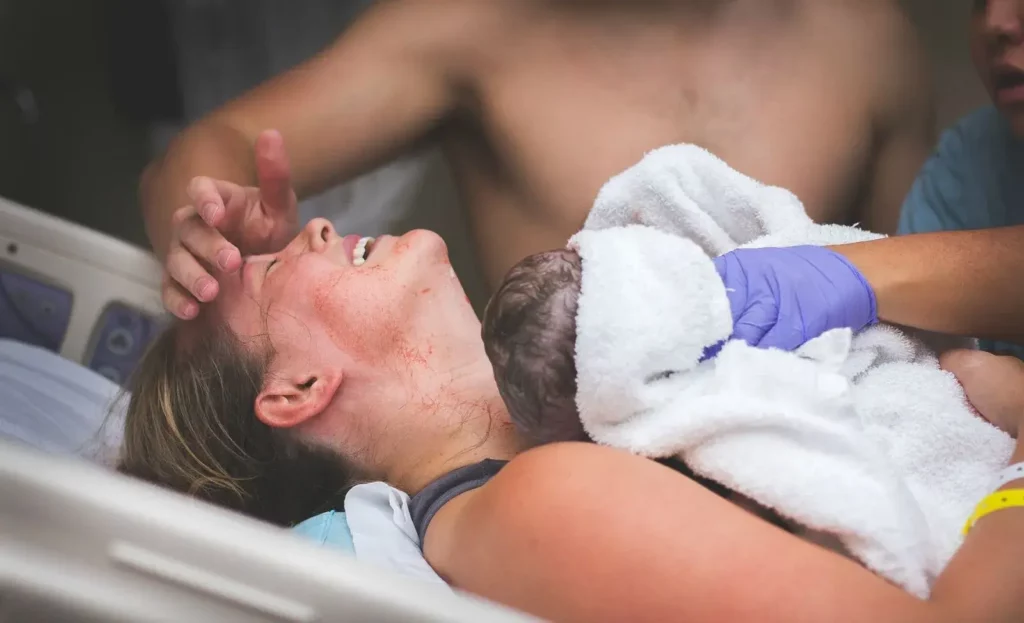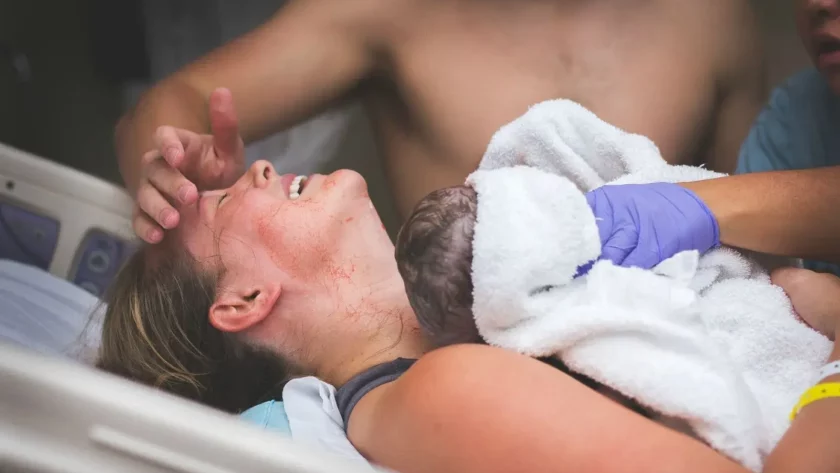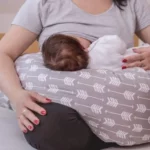Postpartum hair loss and even during pregnancy is a common condition experienced by every new mother or pregnant lady.
It basically happens due to hormonal changes which include estrogen, progesterone, and other hormones that are disturbed during pregnancy.
Estrogen and progesterone are important hormones in women like testosterone in men which play an essential role in the body.
Both estrogen and progesterone prepare your body for pregnancy.
It is also known as telogen effluvium, where rapid hair sheds occur, but most women show thick and lustrous hair during pregnancy.
This is due to the high level of estrogen level, which presents at that 9 months time.
Pregnancy is a common physical and mental condition, where mother fitness is essential because it also affects the baby’s health.
Apart from hair loss after pregnancy, both men and women experience hair loss, and both have several different reasons.
Check Out – Common Hair Care Mistakes And Ways To Avoid Them
Causes of Postpartum Hair Loss
Contents

To understand thick, and shiny hair during pregnancy, and hair loss after pregnancy, first we have to understand the hair growth process.
The first stage is the “anagen“, the second stage is the “catagen“, and the third phase is the “telogen” known as the resting phase”.
As the baby is delivered, all the damage to the bulbs from delivery is triggered, which takes about 2 months.
As a result, about 80% of the anagen phase change into the telogen phase, causing rapid hair loss after delivery.
Hormones are the thing that plays all role in hair growth to fall, during pregnancy estrogen is reach a high level that prevents the hair from falling.
This effect is enhanced by increased blood volume during pregnancy, however, some hair loss occurs daily, but not more.
But, after the delivery, hormones quickly dropped, and blood volume is also decreased, resulting in hair loss after pregnancy.
However, this hormone returns to its normal level within 24 hours, but a prolactin hormone will remain high while breastfeeding.
Check Out – Hair Fall During Rainy Season
Other Causes of Postpartum Hair Loss
There are several other causes that can escalate hair loss after delivery, which include:
Stress: It is the most common reason and anxiety about the future of the baby with you.
Medicines: If the mother is already on medication before pregnancy and starts again after delivery, it may also disturb hormones.
Nutrient deficiency: Not eating a proper diet after pregnancy, may worsen the hair loss condition, which may even stay for a long time.
Chemical use: Some women start using hair chemicals after delivery or excessively used chemicals in their hair.
It can damage your hair in deep, which may cause thin, dry hair, balding, and even some serious issues.
Unbalanced hormones: If the mother already has a disease like obesity, high BP, diabetes, PCOS, and more then it may lead to hair loss.
Timeframe of Postpartum Hair Loss
Here is the general timeline occur of hair loss after delivery which we will start discussing during pregnancy.
During pregnancy – Most women have not seen hair fall, because in this stage estrogen level increase which prevents the hair to fall.
0-3 months after birth – The hormones come return to normal levels, but hair that was in the growing stage may suddenly shift into the shedding stage.
As the result, you notice hair loss, which is seen in almost every woman after pregnancy.
3-6 months stage – It is a continuous phase of shedding, however, it is a temporary phase, where hair grows seen after a few months.
6-12 months stage – Now, this is a stage, where you see hair grow again, however, it may take several months.
Remember, hair fall is not permanent, hair will grow after some time means – after 6 months of delivery, you will see new growing hair.
Also that every woman’s experience of hair fall after pregnancy is different, some see noticeable hair loss, and even some do not.
How To Deal With Postpartum Hair Loss?
There are several ways that you can easily deal with or reduce excessive hair loss after pregnancy.
See, in the first 6 months after pregnancy you can not do anything to stop hair loss, you have to just wait and let them grow.
However, there are a few things that you can do during this time to prevent excessive hair loss including:
Be Gentle With Your Hair
In frustration, don’t punish your hair, so make sure to keep your hair nice because it is a natural process for almost every woman.
So avoid brushing or styling your hair loss hardly it may worsen the hair fall situation, and cause hair damage and breakage.
Basically, avoid anything that creates pressure on your hair, like tight, or pulling hair, and use a wide comb to prevent excessive hair loss.
Eat well-balanced Diet
Eating a well-balanced diet is one of the best ways to deal with postpartum hair loss.
Sufficient vitamins, minerals, and other vital nutrients prevent hair loss by making hair roots strong.
In addition, exercise with a healthy diet combination enhances overall well-being, which prevents further hair fall.
Use Shampoo Gently
Choose the right shampoo, and conditioner (that are chemical and sulfate free) and be gentle with your hair while washing.
Use a gentle shampoo, and wash hair 2 to 3 times a week, avoid deep hair treatment, especially these days.
Manage Your Stress
Stress is one of the common things that affect everyone, whether it is culture, young or old, rich or poor, or gender (1)
It can easily enhance hair loss, even in both men and women, so find to manage stress in the right way.
There are several ways to manage stress including:
Other Ways To Cope With Hair Loss After Delivery
- Avoid new hairstyles
- take prescribed supplements if you see more hair loss than normal.
- Being patient – means – that this is a temporary situation, so don’t be frustrated with your hair.
- Avoid combing on wet hair after a shower or bath
Treatments For Hair loss After Delivery
See, there is no treatment for postpartum hair loss, because it is a natural phenomenon, and any treatment on hair may worsen the condition.
So make sure to handle this condition gently – by checking above mention headline – how to deal with PHL?
Are Supplements Can Help In It?
Yes, there are several supplements that can help, and biotin is one of the commonly used supplements, which helps in hair growth.
Research reveals that biotin specifically, keratin production can contribute to healthy nail and hair growth.
There is much food that is rich in biotin and a natural way to consume biotin includes:
- sunflower seeds
- Egg
- salmon fish, and tuna
- almonds
- sweet potato
- cheddar cheese
There are rich studies are available on its positive effect, but some researchers have also shown its negative effects.
Apart from biotin, there are other supplements that also help in hair growth including:
- Omega-3 fatty acid – is an essential nutrient that prevents you from several diseases, like heart disease, and even cancer.
- Iron – It also helps women during their menstrual cycle, where bleeding leads to iron deficiency.
- Collagen – It is vital for hair growth because it contains amino acids which are necessary for hair growth, and increase hair density and strength.
- Vitamin D – It stimulates hair growth in several ways including reducing swelling and promoting healthy hair follicles and health.
The best vitamin D source is sunlight, but it can also be found in certain foods include seafoods like salmon, tuna, egg yolk, and mushrooms.
Omega-3 fatty acids are found in several foods such as – flaxseed, chia seeds, walnuts, spinach, soybean, etc
Make sure, to talk to your doctor first, before taking any new supplement, especially if you have health issues or you are on medication.
When To Consult With a Doctor?
There are some signs that tell you should consult with a dermatologist are:
- If you experiencing severe hair loss
- hair loss does not stop even after months to a year
- If hair loss affects your daily life.
- It can be a sign of a disease or illness like thyroid, fatigue, weight gain, etc.
- If you experience other health issues with hair fall like weakness, or mood swings, so talk to your healthcare provider.
These signs may be a concern reasons, so make sure to consult your doctor, for proper diagnosis and treatment, before it is too late.
Down Line
It basically happens due to a sudden drop in estrogen and progesterone hormones in the body after delivery.
There are several other reasons that enhance hair loss including stress, chemical use in hair, nutrient deficiency, etc.
But these conditions can easily manage through several ways like using chemical-free shampoo, doing yoga, exercising, eat a well-balanced diet.
Postpartum hair loss is a normal, and temporary condition, which occurs after delivery and may stay longer for 8 months to 1 year.




